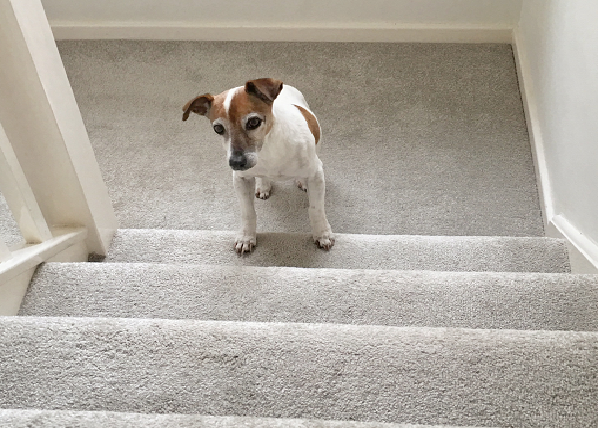Home | Medical Info | How to Recognize Pain in Aging Dogs?
How to Recognize Pain in Aging Dogs?
Keywords:
Recognizing Pain in Aging Dogs
Aging is a natural process, but slowing down doesn’t always mean your dog is simply getting old—it could be a sign of pain. Recognizing pain in senior dogs is crucial for their comfort and well-being. Since dogs tend to hide pain, it’s essential to understand the subtle signs that indicate discomfort and seek veterinary care.
Signs of Pain in Aging Dogs
Pain in older dogs can manifest in behavioral changes, mobility issues, and reluctance to engage in daily activities. Look for the following signs:
Changes in Movement & Mobility:
Avoiding slippery floors
Difficulty getting up or taking longer to stand
Trouble easing into a sitting or lying position
Limping or favoring one limb
Lying down while eating or drinking
Reluctance or inability to jump onto furniture, beds, or into cars
Hesitance to go up or down stairs
Shifting weight away from a painful limb
Walking with a hunched back or lowered head
Featured Resources

We Welcome New Patients!
We're always happy to give your furry friend care at our hospital. Get in touch today!
Contact Us
Changes in Behavior & Attitude:
Increased fatigue and decreased stamina
Reluctance to be groomed or brushed
Resistance to being picked up, especially in small breeds
Avoidance of touch, especially on the back, legs, or tail
Decreased interest in social interaction or play
Increased aggression or irritability
Changes in Daily Habits:
Standing while urinating or defecating instead of squatting
Moving or walking while eliminating
Urinary or fecal accidents due to pain
Restlessness at night due to discomfort
Sleeping more than usual or changing sleeping positions frequently.
Understanding Osteoarthritis and Chronic Pain in Senior Dogs
One of the most common causes of pain in aging dogs is osteoarthritis (OA). It develops due to wear and tear on joints over time, leading to:
Joint inflammation and stiffness
Loss of cartilage and reduced mobility
Chronic discomfort affecting daily life
Many pet owners mistakenly believe slowing down is just a part of aging, but pain is not normal and can be managed with proper treatment.
What to Do If You Suspect Pain in Your Aging Dog
Schedule a Veterinary Examination – A complete assessment helps pinpoint the cause of pain.
Discuss Pain Management Options – Treatments like NSAIDs, monoclonal antibody therapy (Librela®), or joint injections (Synovetin OA®) can provide relief.
Monitor Behavioral Changes – Keep track of symptoms and discuss them with your veterinarian.
Make Home Modifications – Provide soft bedding, ramps for stairs or furniture, and traction mats to help mobility.
Pain Management Solutions for Senior Dogs
Advanced Pain Relief Options:
Monoclonal Antibody Therapy (Librela®) – Monthly injections that target pain at the source.
NSAIDs & Prescription Medications – Reduce inflammation and discomfort in arthritic dogs.
Joint Supplements (Glucosamine, Chondroitin, Omega-3s) – Help maintain joint health.
Steroid & Hyaluronic Acid Joint Injections – Provide direct pain relief to damaged joints.
Physical Therapy & Low-Impact Exercise – Strengthens muscles and improves mobility.
Laser Therapy & Acupuncture – Non-invasive therapies to reduce pain and promote healing.
If you notice any of these signs, schedule a consultation at Canton Animal Hospital today!
Why Choose Canton Animal Hospital for Senior Pet Care?
Experienced Veterinary Team – Specializing in pain management and senior pet care.
Cutting-Edge Treatment Options – Including Librela®, Synovetin OA®, and advanced joint therapies.
Comprehensive Diagnostic Tools – Digital imaging, in-house lab, and mobility assessments.
Personalized Pain Management Plans – Tailored to your dog’s age, lifestyle, and health condition.
Ensure Your Senior Dog’s Golden Years Are Comfortable & Pain-Free
Featured Resources

We Welcome New Patients!
We're always happy to give your furry friend care at our hospital. Get in touch today!
Contact UsTips and Advice from Our Team
Looking for advice about caring for your pet? Our blog features helpful tips and educational material from our team to support your needs.

Pet Arthritis Pain Management – Keeping Dogs & Cats Active
Pet arthritis can cause pain and mobility issues. Our Arthritis Pain Management Guide helps pet owners understand early signs, treatment options, and advanced pain relief solutions like Solensia®, Librela®, and joint injections for better pet comfort.
Read More

